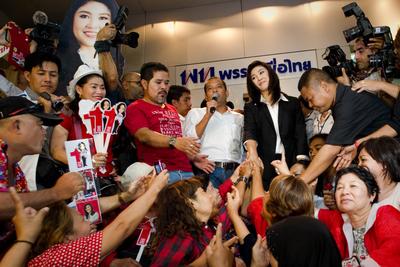The political split, whatever take one puts on it, reflects a deep economic and social divide between Bangkok and the Thai countryside.
The political crisis in Thailand extends back to the coup of September 2006 that ousted popularly elected Thaksin Shinawatra, seen by Bangkok’s ruling elite as authoritarian, corrupt and a threat to the Thai monarchy and the integrity of the nation.
Yet by December 2007, Thaksin’s allies had stormed back to power with a re-branded political vehicle, much to the astonishment of the coup-makers and their supporters in Bangkok. In fact Thaksin remains the most electorally-successful prime minister in Thai history.
As Nich Farrelly explains in this week’s lead essay, ‘with no immediate trigger for another coup, shadowy interests were then used in 2008 to unseat two prime ministers from Thaksin’s side. Those leaders were out-manoeuvred by a concert of royalist-military-judicial forces still unwilling to accept the verdict of the people. Thaksin’s men were replaced by Prime Minister Abhisit Vejjajiva: a youthful, dashing, British-educated career politician from the Democrat Party — a party which has rarely done well in national polls’.
‘Abhisit has now been in power for over two years and has overseen two periods of punctuated political conflict’. He navigated through the turbulent days in April 2009 when the Red Shirt opposition took to the streets, forcing Abhisit to cancel the East Asia Summit. It was an ‘ignominious start to his time as prime minister’, signalling the intention of Thaksin-aligned Red Shirt activists to continue to claim their mandate. Then in 2010, the streets of Bangkok were brought to a standstill and the Abhisit government almost to its knees. Army firepower eventually quelled the uprising.
Fourteen months of calm saw Abhsit’s Democrats eventually become confident enough to call an election.
Now Thaksin’s younger sister, Yingluck Shinawatra, has made a startling comeback as Thaksin’s surrogate, as he bides his time in exile in Dubai. The Puea Thai Party (the For Thais Party) which Yingluck heads surged ahead in the pre-election polls. The novelty that a female leader in Thailand has brought to the contest added to the momentum against the luckless Abhisit. On the way to the ballot box yesterday, Yingluck was set to win a significant mandate. But what seems certain now is that that her election is still unlikely to deliver the political stability in Thailand for which many had hoped.
Observers see the chance of army commanders staging another coup as Yingluck takes power as improbable. The popular base of Yingluck and the Red Shirt Thaksin supporters cautions that trying that on soon would likely provoke a popular uprising and more large-scale bloodshed. Even so, due to the virtual certainty of intense efforts to de-stabilise a Yingluck-led government, only the most adept political skill would ensure that Yingluck gains full command of the instruments of government.
Yingluck is now poised to shake up the Thai political order and challenge the vilification of her brother by the Thai authorities since the coup in 2006.
As Farrelly argues, yesterday’s election was ‘a referendum on everything that has happened over the past five years. It promises to be an important vote for the future of Thailand and one that will send a message about the country’s troubled record of respecting democratic mandates’.
Who has won Thailand’s election matters less than how the losers cope with defeat.
Growing pains…
Over the weekend we moved to a new website and server (the www.eastasiaforum.org address remains the same) to make the site faster and make it easier to find older articles. The huge growth in traffic on the EAF site meant that we had to solve overload problems on the old server that I know have frustrated many of our readers at peak times. We’ve also got a new look, consistent with the East Asia Forum Quarterly. Please bear with us if there are any teething problems. As always, we welcome your feedback on the design, usability and content of the site.
Peter Drysdale

